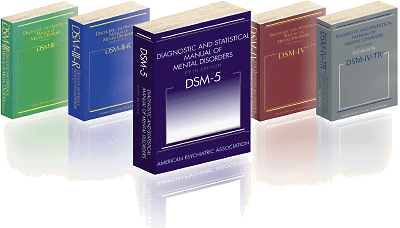Sessions Will Provide In-Depth Look at New DSM
Psychiatric News
by Kuhl Emily, Ph.D.
February 15, 2013
… Beyond merely summarizing the most notable revisions, speakers will articulate the underlying rationales of the changes and how DSM-5 can be implemented in clinical practice and in research settings.
Speakers from all of the DSM-5 work groups will be present to address their respective diagnostic areas, while further information will describe other areas, such as use of codes for nonmental disorder conditions of clinical importance, DSM-5’s revised approach to the DSM-IV multiaxial system, aspects of DSM-5 relevant to forensic issues and needs, the revised definition of what constitutes a mental disorder, and the reasoning behind the new chapter structure of the manual.
This is a blurb about the San Francisco APA meeting in May where the DSM-5 will be unveiled and will apparently dominate the agenda. Just a couple of comments:
-
implemented in clinical practice and in research settingsThe DSM-5 leaders have repeatedly lamented that the DSM criteria haven’t been very helpful in research and, in fact, set out to rebuild the system to fix that – but failed. They themselves have high hopes for the NIMH RDoC effort and actually had a shot at taking credit for it. Looks like they’re out to put a new spin on the DSM-5 in this presentation. Since by research they mean neuroscience research, I wonder what they are going to be talking about?
-
Explanation of the alternative model of personality and personality disorder assessment, as provided in Section IIIThis was a hopelessly complex effort that was dumped by the Trustees – moved to the "needs further research" section. Looks like they can’t let it go. I expect there won’t be a lot of trouble getting a seat in that session.
-
the revised definition of what constitutes a mental disorderI haven’t read anything recently about this one, but the proposed definition was previously "a behavioral or psychological syndrome that reflects an underlying psychobiological dysfunction". This eliminates most other clinical mental health specialties and is a likely reason they won’t support the DSM-5. It’s the abandonment of Dr. Spitzer’s non-etiological descriptive paradigm and a certification of the dreams of Robins and Guze [the neoKraepelinians] from long ago, because by "underlying psychobiological", they mean "biological" – an etiological decree. If I were a biologically oriented psychiatrist, I would be embarrassed by this definition, because it’s not true for the majority of people that seek mental health care. If they were going to shrink the DSM-5 to fit known biological conditions, it would be a thin pamphlet. If they included "likely" biological conditions, it would be a slim book. If they also included "conditions responding to medications," it would only be a bit thicker. But this definition says it’s "what constitutes a mental disorder", so it expels me and, in fact, most mental health professionals. Were I to say this to Drs. Kupfer or Regier, they’d assure me that I’m being melodramatic, living in the past, and say something like Dr. Insel’s Clinical Neuroscience proclamation or Dr. Nemeroff’s declaration – the brain is involved in just everything. To which I would say, "call me when you have a solid evidence-based explanation that "what constitutes a mental disorder" is "underlying psychobiological dysfunction" – otherwise, tell it to the marines." This definition fits the needs of third party carriers and the pharmaceutical industry. If that’s what industry needs, that’s their business. But they should put out their own code-books. We don’t need to do it for them.
Why don’t you say what you feel, 1boringoldman?…

Bang on the money, Mikey.
Personally, I cannot wait for my ‘revised Cultural Formulation Interview.’ And if the kappa scores for the DSM5 are worse than those for the DSM-iv which edition will one use? Surrealism rules ok.
“the proposed definition was previously “a behavioral or psychological syndrome that reflects an underlying psychobiological dysfunction”. This eliminates most other clinical mental health specialties and is a likely reason they won’t support the DSM-5.”
I hadn’t really though about that.
I still wonder what exactly “psychobiological” is going to be defined as.